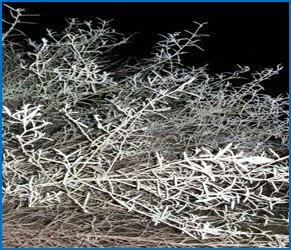Comparative study of FESEM, EDS, FTIR on alkali treated and untreated fiber of Aerva
DOI:
https://doi.org/10.61343/jcm.v1i01.8Keywords:
Bio Composites, Natural Fiber, Aerva TomentosaAbstract
The Amaranthaceae family plant, Aerva Tomentosa, grows abundantly in western Rajasthan, India. In the production of bio composites, the Aerva Tomentosa (Bui) can be used successfully as natural fibers. In this study, Aerva Tomentosa (Bui) fibers were extracted from the Bui plant and treated with an alkaline solution containing 5% NaOH. The investigation involved morphological and chemical characteristics of the extracted untreated Aerva Tomentosa fibers (ATF(0)) and extracted alkali treated Aerva Tomentosa fibers (ATF(1)). According to an analysis of ATF(0) and ATF(1) using Fourier-transform infrared (FTIR) spectroscopy, both ATF(0) and ATF(1) included functional groups for cellulose, hemicellulose, and lignin. The elimination of extractives from the surface of the fibers isolated from Aerva tomentosa is demonstrated by FESEM and EDS analysis. The surface of untreated fibers becomes smoother following treatment, as evidenced by FESEM images taken at various resolutions.
References
M.M. Kabir, H. Wang, K.T. Lau, F. Cardona, “Chemical treatments on plant-based natural fibre reinforced polymer composites: An overview”, Compos. Part B Eng. 43 (2012) 2883–2892. https://doi.org/10.1016/j.compositesb.2012.04.053.
K.G. Ramawat, “Fiber Plants: An Overview”, (2017). https://doi.org/10.1007/978-3-319-44570-0.
S. Kalia, B.S. Kaith, I. Kaur, “Pretreatments of natural fibers and their application as reinforcing material in polymer composites-a review”, Polym. Eng. Sci. 49 (2009)1253- 1272.https://doi.org/10.1002/pen.21328.
B. Clair, A. Déjardin, G. Pilate, T. Alméras, “Is the G-Layer a Tertiary Cell Wall?”, Front. Plant Sci. 9 (2018). https://doi.org/10.3389/fpls.2018.00623.
File:Aerva tomentosa.JPG - Wikimedia Commons, (n.d.). https://commons.wikimedia.org/wiki/File:Aerva_tomentosa.JPG.
M.A. Soliman, “Cytogenetical studies on Aerva javanica (Amaranthaceae)”, ISSN1120-4052. (2015) 195–199.
P. Chawla, A. Chawla, N. Vasudeva, S.K. Sharma, “A review of chemistry and biological activities of the genus Aerva - A desert plant”, Acta Pol. Pharm. - Drug Res. 69 (2012) 171–177.
M.C. Sharma, M.K. Rathore, S. Batra, G.K. Singh, B.P. Nagori, “Pharmacognostical Studies on Inflorescences of Aerva pseudotomantosa Blatt”, (2014).
R.D. Kale, T. Getachew Alemayehu, V.G. Gorade, “Extraction and Characterization of Lignocellulosic Fibers from Girardinia Bullosa (Steudel) Wedd. (Ethiopian Kusha Plant)”, J. Nat. Fibers. 17 (2020) 906–920. https://doi.org/10.1080/15440478.2018.1539940.
T.P. Sathishkumar, P. Navaneethakrishnan, S. Shankar, R. Rajasekar, “Investigation of chemically treated randomly oriented sansevieria ehrenbergii fiber reinforced isophthallic polyester composites”, J. Compos. Mater. 48 (2014) 2961–2975. https://doi.org/10.1177/0021998313503589.
A. Gholampour, T. Ozbakkaloglu, A review of natural fiber composites: properties, modification and processing techniques, characterization, applications, J. Mater. Sci. 55 (2020) 829–892. https://doi.org/10.1007/s10853-019-03990-y.
P. Valášek, M. Müller, V. Šleger, V. Kolář, M. Hromasová, R. D’amato, A. Ruggiero, Influence of alkali treatment on the microstructure and mechanical properties of coir and abaca fibers, Materials (Basel). 14 (2021). https://doi.org/10.3390/ma14102636.
M. Sood, G. Dwivedi, Effect of fiber treatment on flexural properties of natural fiber reinforced composites: A review, Egypt. J. Pet. 27 (2018) 775–783. https://doi.org/10.1016/J.EJPE.2017.11.005.
N.L. Bhandari, B.R. Dhungana, R. Lach, S. Henning, R. Adhikari, Synthesis and Characterization of Urea–Formaldehyde Eco-Friendly Composite Based On Natural Fibers, J. Inst. Sci. Technol. 24 (2019) 19–25. https://doi.org/10.3126/jist.v24i1.24623.
S. Pokhrel, M. Shrestha, M. Slouf, J. Sirc, R. Adhikari, Eco-Friendly Urea-Formaldehyde Composites Based on Corn Husk Cellulose Fiber, Int. J. Compos. Mater. 2020 (2020) 29–36. https://doi.org/10.5923/j.cmaterials.20201002.01.
J. Wan, Y. Wang, Q. Xiao, “Effects of hemicellulose removal on cellulose fiber structure and recycling characteristics of eucalyptus pulp”, Bioresour. Technol. 101 (2010) 4577–4583. https://doi.org/10.1016/j.biortech.2010.01.026.
R. Kumar, P.K. Rakesh, D. Sreehari, D. Kumar, T.P. Naik, Experimental investigations on material properties of alkali retted Pinus Roxburghii Fiber, Biomass Convers. Biorefinery. (2023). https://doi.org/10.1007/s13399-023-04245-2.
P. Sabarinathan, K. Rajkumar, V.E. Annamalai, K. Vishal, “Static and dynamic behavior of micrometric agro Prunus amygdalus particulate distributed interpolymer layer‐kenaf composite”, Polym. Compos. 41 (2020) 3309–3321. https://doi.org/10.1002/pc.25621.
S. Thamarai Selvi, R. Sunitha, L. Ammayappan, C. Prakash, “Impact of Chemical Treatment on Surface Modification of Agave Americana Fibres for Composite Application – A Futuristic Approach”, J. Nat. Fibers. 00 (2022) 1–14. https://doi.org/10.1080/15440478.2022.2142726.
M. Fan, D. Dai, B. Huang, Fourier Transform Infrared Spectroscopy for Natural Fibres, in: Fourier Transform - Mater. Anal., InTech, 2012. https://doi.org/10.5772/35482.
C. Tenazoa, H. Savastano, S. Charca, M. Quintana, E. Flores, “The Effect of Alkali Treatment on Chemical and Physical Properties of Ichu and Cabuya Fibers”, J. Nat. Fibers. 18 (2021) 923–936. https://doi.org/10.1080/15440478.2019.1675211.
A. Adugna Ayalew, A. Fenta Wodage, Characterization of Chemically Treated Sisal Fiber/Polyester Composites, J. Eng. (United Kingdom). 2022 (2022).
M.A. Khan, K.M.I. Ali, S.C. Basu, IR studies of wood plastic composites, J. Appl. Polym. Sci. 49 (1993) 1547–1551. https://doi.org/10.1002/app.1993.070490905.
M.K. Bin Bakri, E. Jayamani, S. Hamdan, M.R. Rahman, K.H. Soon, A. Kakar, Fundamental study on the effect of alkaline treatment on natural fibers structures and behaviors, ARPN J. Eng. Appl. Sci. 11 (2016) 8759–8763.
H.A. Eltahir, W. Xu, X. Lu, C. Li, L. Ren, J. Liu, M.A. Abedalwafa, Prospect and Potential of Adansonia digitata L. (Baobab) Bast Fiber in Composite Materials Reinforced with Natural Fibers. Part1: Fiber Characterization, J. Nat. Fibers. 18 (2021) 2197–2207. https://doi.org/10.1080/15440478.2020.1724234.
G. Bar, K. Chaudhary, “Characterization of Textile Grade Novel Bauhinia Vahlii Fiber”, J. Nat. Fibers. 00 (2022) 1-16. https://doi.org/10.1080/15440478.2022.2143464.

Downloads
Published
How to Cite
Issue
Section
License

This work is licensed under a Creative Commons Attribution 4.0 International License.
Copyright© by the author(s). Published by journal of Condensed Matter. This is an open access article distributed under the terms of the Creative Commons Attribution (CC BY) license (https://creativecommons.org/licenses/by/4.0/), which permits unrestricted use, distribution, and reproduction in any medium, provided the original author(s) and source are credited.









